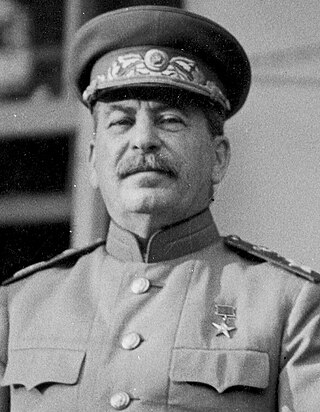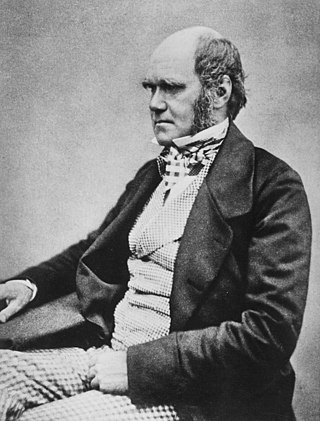
Joseph Vissarionovich Stalin was a Georgian-born Soviet politician and revolutionary who was the longest-serving leader of the Soviet Union from 1924 until his death in 1953. He held power as General Secretary of the Communist Party from 1922 to 1952, and as Chairman of the Council of Ministers from 1941 until his death. Initially governing the country as part of a collective leadership, Stalin consolidated his power to become a dictator by the 1930s. Ideologically, he formalised his Leninist interpretation of Marxism as Marxism–Leninism, while the political and economic system he implemented is known as Stalinism.

Jefferson F. Davis was an American politician who served as the first and only president of the Confederate States from 1861 to 1865. He represented Mississippi in the United States Senate and the House of Representatives as a member of the Democratic Party before the American Civil War. He was the United States Secretary of War from 1853 to 1857.

Jeffrey Lionel Dahmer, also known as the Milwaukee Cannibal or the Milwaukee Monster, was an American serial killer and sex offender who killed and dismembered seventeen males between 1978 and 1991. Many of his later murders involved necrophilia, cannibalism, and the permanent preservation of body parts—typically all or part of the skeleton.

Malcolm X was an American Muslim minister and human rights activist who was a prominent figure during the civil rights movement. A spokesman for the Nation of Islam (NOI) until 1964, he was a vocal advocate for Black empowerment and the promotion of Islam within the Black community. A posthumous autobiography, on which he collaborated with Alex Haley, was published in 1965.

Sir Winston Leonard Spencer Churchill was a British statesman, soldier, and writer who twice served as Prime Minister of the United Kingdom, from 1940 to 1945 during the Second World War, and again from 1951 to 1955. Apart from two years between 1922 and 1924, he was a Member of Parliament (MP) from 1900 to 1964 and represented a total of five constituencies. Ideologically an adherent to economic liberalism and imperialism, he was for most of his career a member of the Conservative Party, which he led from 1940 to 1955. He was a member of the Liberal Party from 1904 to 1924.

Paul-Michel Foucault was a French philosopher, historian of ideas, writer, political activist, and literary critic. Foucault's theories primarily address the relationships between power and knowledge, and how they are used as a form of social control through societal institutions. Though often cited as a structuralist and postmodernist, Foucault rejected these labels. His thought has influenced academics, especially those working in communication studies, anthropology, psychology, sociology, criminology, cultural studies, literary theory, feminism, Marxism and critical theory.

The Gulf War was an armed conflict between Iraq and a 42-country coalition led by the United States. The coalition's efforts against Iraq were carried out in two key phases: Operation Desert Shield, which marked the military buildup from August 1990 to January 1991; and Operation Desert Storm, which began with the aerial bombing campaign against Iraq on 17 January 1991 and came to a close with the American-led liberation of Kuwait on 28 February 1991.

Vlad III, commonly known as Vlad the Impaler or Vlad Dracula, was Voivode of Wallachia three times between 1448 and his death in 1476/77. He is often considered one of the most important rulers in Wallachian history and a national hero of Romania.

Pink Floyd are an English rock band formed in London in 1965. Gaining an early following as one of the first British psychedelic groups, they were distinguished by their extended compositions, sonic experiments, philosophical lyrics and elaborate live shows. They became a leading band of the progressive rock genre, cited by some as the greatest progressive rock band of all time.

Charles Robert Darwin was an English naturalist, geologist and biologist, widely known for his contributions to evolutionary biology. His proposition that all species of life have descended from a common ancestor is now generally accepted and considered a fundamental concept in science. In a joint publication with Alfred Russel Wallace, he introduced his scientific theory that this branching pattern of evolution resulted from a process he called natural selection, in which the struggle for existence has a similar effect to the artificial selection involved in selective breeding. Darwin has been described as one of the most influential figures in human history and was honoured by burial in Westminster Abbey.

Genghis Khan, also Chinggis Khan, was the founder and first khan of the Mongol Empire, which he ruled from 1206 until his death in 1227; it later became the largest contiguous empire in history. After spending most of his life uniting the Mongol tribes, he launched a series of military campaigns, conquering large parts of China and Central Asia.

Ganesha, also spelled Ganesh, and also known as Ganapati, Vinayaka, and Pillaiyar, is one of the best-known and most worshipped deities in the Hindu pantheon and is the Supreme God in the Ganapatya sect. His depictions are found throughout India. Hindu denominations worship him regardless of affiliations. Devotion to Ganesha is widely diffused and extends to Jains and Buddhists and beyond India.

Fistulinella is a genus of bolete fungi in the family Boletaceae. The genus has a pantropical distribution, and contains 15 species. Fistulinella was circumscribed by German mycologist Paul Christoph Hennings in 1901.

The Russian Soviet Federative Socialist Republic, previously known as the Russian Soviet Republic and the Russian Socialist Federative Soviet Republic, as well as being unofficially referred to as Soviet Russia, the Russian Federation, or simply Russia, was an independent federal socialist state from 1917 to 1922, and afterwards the largest and most populous constituent republic of the Soviet Union (USSR) from 1922 to 1991, until becoming a sovereign part of the Soviet Union with priority of Russian laws over Union-level legislation in 1990 and 1991, the last two years of the existence of the USSR. The Russian SFSR was composed of sixteen smaller constituent units of autonomous republics, five autonomous oblasts, ten autonomous okrugs, six krais and forty oblasts. Russians formed the largest ethnic group. The capital of the Russian SFSR and the USSR as a whole was Moscow and the other major urban centers included Leningrad, Stalingrad, Novosibirsk, Sverdlovsk, Gorky and Kuybyshev. It was the first socialist state in the world.

Terminator 2: Judgment Day is a 1991 American science fiction action film directed by James Cameron, who co-wrote the script with William Wisher. Starring Arnold Schwarzenegger, Linda Hamilton, Robert Patrick, and Edward Furlong, it is the sequel to The Terminator (1984) and is the second installment in the Terminator franchise. In the film, the malevolent artificial intelligence Skynet sends a Terminator—a highly advanced killing machine—back in time to 1995 to kill the future leader of the human resistance John Connor, when he is a child. The resistance sends back a less advanced, reprogrammed Terminator to protect Connor and ensure the future of humanity.

The Union of Soviet Socialist Republics (USSR) was dissolved on 26 December 1991 by Declaration № 142-Н of the Soviet of the Republics of the Supreme Soviet of the Soviet Union, formally establishing the dissolution of the Soviet Union as a sovereign state and subject of international law. It also brought an end to the Soviet Union's federal government and General Secretary Mikhail Gorbachev's effort to reform the Soviet political and economic system in an attempt to stop a period of political stalemate and economic backslide. The Soviet Union had experienced internal stagnation and ethnic separatism. Although highly centralized until its final years, the country was made up of 15 top-level republics that served as the homelands for different ethnicities. By late 1991, amid a catastrophic political crisis, with several republics already departing the Union and the waning of centralized power, the leaders of three of its founding members, the Russian, Belorussian, and Ukrainian SSRs, declared that the Soviet Union no longer existed. Eight more republics joined their declaration shortly thereafter. Gorbachev resigned on 25 December 1991 and what was left of the Soviet parliament voted to end itself.

Fistulinella wolfeana is a bolete fungus in the family Boletaceae found in Hidalgo, Mexico, where it grows under pine and oak in mixed forest. It was described as new to science in 1991.

Fistulinella mollis, commonly known as the marshmallow bolete, is a bolete fungus in the family Boletaceae found in Australia.

Fistulinella nivea is a species of bolete fungus in the family Boletaceae found in New Zealand. First described by mycologist Greta Stevenson in 1962 as a species of Tylopilus, it was transferred to the genus Fistulinella by Rolf Singer. Stevenson originally discovered the bolete in 1955 at Tōtaranui, where it was growing under Nothofagus. Its fruitbody has a white cap with a diameter of up to 3 cm (1.2 in) atop a stipe measuring up 7 cm (2.8 in) long and 1–1.5 cm (0.4–0.6 in) thick. The pores on the cap underside are up to 1.5 mm in diameter. The pore surface is initially white before changing to pale pink. Spores are ellipsoid, hyaline (translucent), and measure 17–18 by 6–7 μm.

















